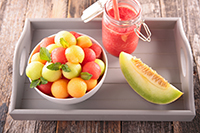 At last! Melon season is fast approaching. That means soon you'll be treating yourself to one of summer's true delights: a ripe, juicy, sweet melon.
At last! Melon season is fast approaching. That means soon you'll be treating yourself to one of summer's true delights: a ripe, juicy, sweet melon.
Besides tasting oh-so-good, melons are good for you. They are rich in vitamin C, which helps boost the immune system. Cantaloupes are an especially good source of the vitamin. A little less than a half cup of this warm-weather favorite provides up to two-thirds of the current recommended amount of daily vitamin C.
Some melons are also an excellent source of vitamin A, which helps night vision, and potassium, which can help keep blood pressure in a healthy range.
Melons are also low in calories and sodium and are saturated fat- and cholesterol-free.
Of course, to truly enjoy melons, you want to select the ripest you can find. Here are some signs of ripeness:
• Ripe cantaloupes have a dull yellow background with raised netting. These melons should be fragrant, and the blossom end (which is opposite of the end with the small dent) should yield a bit when pressed.
• Honeydew melons turn from green to a creamy white to yellow as they ripen. Avoid buying green ones, but a creamy white one will ripen on a countertop in a few days.
• Ripe watermelons should be yellow (not white) at their pale side—that's where they rested while growing—and heavy for their size. Buying a halved watermelon? Look for one that is firm, brightly colored and free of white streaks.
You can keep melons at room temperature for up to a week or until they're fully ripe. Then refrigerate cut melon in a tightly covered container and eat within five days.
Sources: Academy of Nutrition and Dietetics; American Institute for Cancer Research; University of Wyoming Extension Service